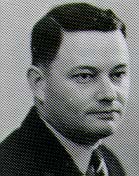
Year Born: 1906
Year Died: 1962
Year of Induction: 1984
Pioneer – Member of CAB Hall of Fame
Chandler, George (1906-1962)
In 1926, radio engineer George Chandler purchased CFXC New Westminster, B.C. from founder Fred Hume, just two years after the station went on the air. The price was reported to be anywhere from $350 to $600, with $50 down and $25 a month.
He changed the call letters to CJOR and moved the studio to Vancouver. The station’s power was 50 watts with a fish pole antenna located near the old Marpole Bridge at the south end of the city.
Broadcasts originated from the St. Julian Hotel (later the Ritz) with Chandler’s two sisters singing duets to the audience. In 1930 he moved the studio to the Alexandria Ballroom at the corner of Hornby and Robson streets, and two years later to the basement of the Grosvenor Hotel.
Chandler’s station introduced numerous radio personalities to Vancouver, including Billy Browne Sr. with his Breakfast with Browne program, the G.G. Man Colin Fitzgerald and Dick Diespecker who did a show from the top of the Lions Gate Bridge as it was being constructed.
In 1938 he hired ham radio operator Vic Waters from the Vancouver Province newspaper after he broke the news of the Nazi invasion of Norway. Waters later became program director and over the years more personalities were introduced, among them Barrie Clark, Red Robinson, Brian Forst, Bruno Cimolai, Doug Campbell, Jack Webster, Monty McFarlane and racetrack announcer Jack Short.
On July 15, 1941, as president of the Western Association of Broadcasters, Chandler addressed delegates at a two-day convention in Harrison Hot Springs B.C., criticizing Ottawa for its slowness in issuing radio licences. He stated that “red tape” was hampering Canadian stations, whereas radio licences could be obtained relatively quickly in the U.S.
Chandler was a recognized expert in the field of broadcast wavelengths and powers, representing Canada at the North American Regional Broadcasting Conference in Montreal in 1949. He represented the Canadian government at the Washington Broadcast Conference in 1950. He also was chairman of the technical committee of the Canadian Association of Broadcasters.
In 1956, he appeared in Montreal before the Fowler royal commission on broadcasting, stating that, “The radio industry has been subjected to a constant and rising pressure from those who believe in restrictive control of this vital medium of information.” He charged that controls “have always operated against the better interests of the listening public, the artists and others employed in radio and television, the private operator himself and the commerce of the nation.”
During his broadcast years, he had been president of Tru-View Television Ltd., a pioneer cablevision company in Vancouver. He was a director of the CAB for several years, first president of the B.C. Association of Broadcasters and a member of radio’s 25-year club, the Institute of Radio Engineers and the Vancouver Board of Trade.
George Chandler died April 20, 1962 at the age of 55. CJOR was passed on to his wife Marie, a few months before the hiring of highly controversial commentator Pat Burns.
In 1965 the Board of Broadcast Governors (BBG) forced an ownership re-organization of the station, following complaints over its open line programs and compensation to shareholders. The BBG ruling was released on September 23rd of that year and CJOR was turned over to Vancouver businessmen Ralph Cunningham and Jim Pattison.
In 1984, George Chandler was inducted posthumously into the CAB Hall of Fame.
Written by Gord Lansdell – August, 2003
